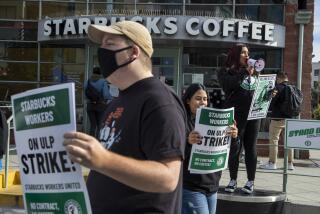High Court Settles Dispute Over Minkow Bankruptcy : Justice: The ruling on interest payments is also seen as a victory for bondholders of Lincoln Savings’ parent firm.
WASHINGTON — The Supreme Court, ruling in a case that grew out of the financial collapse of Barry Minkow’s phony carpet-cleaning business, said Wednesday that banks and other lenders are entitled to keep recent interest payments from a bankrupt company, rather than turn them back to a bankruptcy trustee.
The 9-0 ruling is a victory for lenders and a setback for the remaining creditors of a bankrupt firm, although the actual amount of money involved in the ZZZZ Best Co. case is relatively small.
The decision will also likely kill the effort by American Continental Corp. in Phoenix to recoup preference payments, which are amounts paid to creditors during 90 days preceding a bankruptcy.
In 2,100 lawsuits filed last summer, the parent company of Irvine-based Lincoln Savings & Loan sought the return of $24.5 million in preference payments. Most of that amount was sought from small investors in American Continental who received more than $1,000 each in principal and interest in the three months before the company filed for bankruptcy in April, 1989.
A federal judge in Tucson presiding over civil litigation stemming from the collapse of American Continental and Lincoln halted the company’s effort until the Supreme Court ruled in the ZZZZ Best case.
In its decision Wednesday, the nation’s high court said that as long as interest payments are made in the “ordinary course of business,” they can be retained by the creditor--in this case Union Bank--and are not part of the bankruptcy settlement (Union Bank vs. Wolas, 90-1491).
“This is a very important decision, particularly for banks in California,” said Los Angeles lawyer Robert L. Morrison, who filed a court brief on behalf of the California Bankers Assn.
“It’s terrific,” said Ronald Rus of Orange, one of the lawyers for American Continental bondholders. “It’s a victory. The payments made to the bondholders were in American Continental’s ordinary course of business. This decision means they have a defense to the preference actions filed by the company.”
But William Rose, a lawyer for American Continental, said he wasn’t sure the decision spelled the death knell for his preference lawsuits. He said he must review it before deciding what to do next.
Earlier this year, the U.S. 9th Circuit Court of Appeal in California ruled that a bankrupt company’s interest payments within the previous 90 days before filing for protection were, in effect, a dispersal of its assets and therefore must be turned over to a bankruptcy trustee.
Union Bank in Los Angeles, joined by other California financial institutions, said this ruling would put their regular interest payments at risk when a creditor firm goes bankrupt. Not only would they lose the amount they had lent, but they would also have to refund the recent interest payments.
“The 9th Circuit had taken away one of the basic protections given to lenders,” said John Albert Graham, a Los Angeles lawyer who represented Union Bank.
In 1986, Union Bank lent Minkow’s ZZZZ Best Co. $7 million. In July, 1987, ZZZZ Best declared bankruptcy, with more than $20 million in liabilities. It had made monthly interest payments to Union Bank totaling more than $270,000 by the time it filed for bankruptcy.
To compound the loss for Union Bank, the appeals court ruling would have required it to return $104,000 in interest payments received in the three months before the July, 1987, bankruptcy filing and turn them over to trustee Herbert Wolas.
Minkow, who touted himself as a teen-age business whiz, began his carpet-cleaning business as a 15-year-old in his parents’ Reseda garage and parlayed it into a reputed $100-million corporation. But the company was built mostly on hype and phony bookkeeping, and it collapsed suddenly in 1987. He was convicted of fraud and sentenced in 1989 to 25 years in federal prison.
Wolas, the bankruptcy trustee, said only about $1 million in assets is available to pay creditors, whose claims reach near $30 million. Times staff writer James S. Granelli contributed to this story.
More to Read
Inside the business of entertainment
The Wide Shot brings you news, analysis and insights on everything from streaming wars to production — and what it all means for the future.
You may occasionally receive promotional content from the Los Angeles Times.











